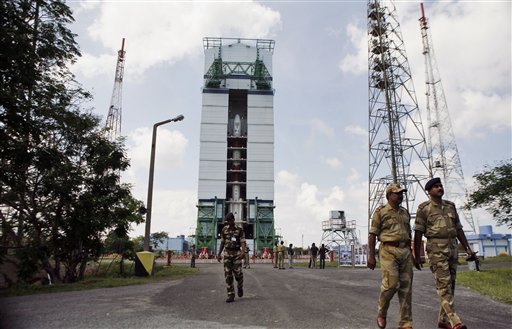India launches first mission to Mars

In this Wednesday, Oct. 30, 2013 photo, Central Industrial Security Force (CISF) personnel walk near the Polar Satellite Launch Vehicle (PSLV – C25) at the Satish Dhawan Space Center at Sriharikota, in the southern Indian state of Andhra Pradesh. AP
NEW DELHI — India on Tuesday launched its first spacecraft bound for Mars, a complex mission that it hopes will demonstrate and advance technologies for space travel.
Hundreds of people watched the rocket carrying the Mars spacecraft take off from the east-coast island of Shriharikota and streak across the sky. Many more across the country watched live TV broadcasts provided by the Indian Space and Research Organization.
The 1,350-kilogram (3,000-pound) Mangalyaan orbiter was headed first into an elliptical orbit around Earth, after which a series of technical maneuvers and short burns will raise its orbit before it slingshots toward Mars.
Mangalyaan, which means “Mars craft” in Hindi, must travel 780 million kilometers (485 million miles) over 300 days to reach an orbit around the red planet next September.
“The biggest challenge will be precisely navigating the space craft to Mars,” said K. Radhakrishnan, chairman of the Indian space agency. “We will know if we pass our examination on Sept. 24, 2014.”
Article continues after this advertisementIndia is aiming to follow the Soviet Union, United States and Europe in having a successful visit to Mars.
Article continues after this advertisement“These missions are important. These are things that give Indians happiness and bragging rights,” said Raghu Kalra of the Amateur Astronomers Association Delhi. “Even a poor person, when he learns that my country is sending a mission to another planet, he will feel a sense of pride for his country, and he will want to make it a better place.”
Some have questioned the $72 million price tag for a country of 1.2 billion people still dealing with widespread hunger and poverty. But India defended the Mars mission, and its $1 billion space program in general, by noting its importance in providing high-tech jobs for scientists and engineers and practical applications in solving problems on Earth.
Decades of space research has allowed India to develop satellite, communications and remote sensing technologies that are helping to solve everyday problems at home, from forecasting where fish can be caught by fishermen to predicting cataclysmic storms and floods.